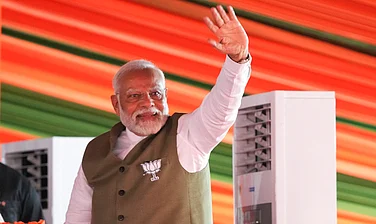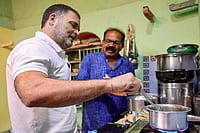He is everywhere. There are his cutouts in which the prime minister is holding a broom. In others, he is waving at nobody in particular. And then, there are the selfie booths at airports, in institutions, and at railway stations, with a 3D life-size replica of Modi. For everyone to be with the prime minister. The cult of personality has been a dominant feature of Indian politics since Modi became the prime minister when even vaccination certificates had his photo. It is an idealised, heroic image created through mass media and propaganda centred around nationalism and now, religion and majoritarian politics.
Narendra Modi And His Phantasmagoric Appeal
In this issue of Outlook, we look at Modi’s personality, his cult, and his brand in the light of the recent consecration of the Ram temple in Ayodhya

This is the time of apotheosis, the culmination of it all in deification almost.
Prime Minister Narendra Modi has gone beyond a human avatar to be hailed as an avatar of Lord Vishnu by his own party members. In the Ram temple consecration ceremony, Modi was the man who supposedly returned Lord Ram to his estranged homeland Ayodhya. In his speech, he said that Ram had been living under a tent and now, Modi has got him his birthplace—a pucca house like crores of Indians. Modi, and not an ordained priest, did the honours of setting up Lord Ram in his newly-built abode while leaders and others, including Bollywood celebrities, cheered him on.
Last year, in the new Parliament, Modi had carried the sengol, a kind of sceptre that reminds one of kings and their coronations. Such a sceptre has always been associated with monarchies or priests. Symbolism matters. Optics is everything in the digital era. Modi is an influencer. He has more than 80 million followers on Instagram. He is real and surreal. Unreal, too. Depends on who you are and how you look at him. You can’t ignore him. There is no escape from him.
Modi is a myth, a person, an avatar, a holographic image even. He is omnipresent. Omniscient. He is one and many.
With the general elections coming up, Modi is projected as the man responsible for Lord Ram’s homecoming. The orange flags are everywhere now.
Political theology is at the core of legitimising democracy and its institutions. Such a reading helps us make sense of the present where those who disagree with all of this are branded as illegitimate, irrelevant and inconsequential almost.
Modi has made all this possible. He has many versions. For all kinds. For women, the old, the young, the tribals, the Dalits, the upper castes and even for minorities. He can morph into anything. His personality has superseded the party and the ideologues so much so that even the wind around elections is branded as the Modi wave. He can reboot, reconfigure and redistribute his many images to the many people of this country.
He can hang with the birds, dive into the sea, live in the wild, retreat into a cave, play host to the world powers, and can even cry. He is vulnerable and he is a superman. He is also now elevated to the divine stage.
Most media is mesmerised by him, in fear of him. His glorification knows no bounds. He is on covers, billboards, channels, in the newspapers. He is even in textbooks and temples.
Religion hasn’t receded from public life to a private realm but has gained more power over the years and is now asserting itself as a force and it is this force that legitimises the divine kingship of Modi and bestows exceptional authority upon him. It is the charisma channelised via many props, including bodily optics. It is now beyond Hindutva. It is Moditva-oriented populist politics that has the sanction of the divine kingship in Hindu texts and promises ideological salvation to a nation.
There is the saintly avatar. There is also the sophisticated fashionable version—a mediation tactic where fashion designer Troy Costa was hired for a wardrobe change for Modi in 2014 when he first became prime minister, and ahead of the Brazil, Russia, India, China, and South Africa (BRICS) summit in Brazil and his US visit. It is called Omnipresent Marketing, which is an approach that “aims to be at every customer interaction, regardless of the device or channel. The aim being to ensure a bespoke, always-on, highly personalised experience.”
The 2024 general elections will be about Modi and Ram. Both avatars. One is God. The other, almost one now.
In this issue of Outlook, we look at Modi’s personality, his cult, and his brand in the light of the recent consecration of the Ram temple in Ayodhya, which also kickstarts the election campaigns. It is us and God then.
(This appeared in the print as 'Phantasmagoric Appeal Of The One')
- Previous StoryOla Founder & Comedian Kunal Kamra Engage In Online Spat Over Customer Service Issue; Ola Shares Fall | Explained
- Next Story


























